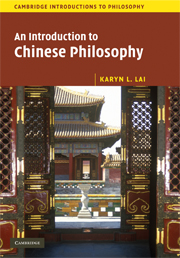Book contents
- Frontmatter
- Contents
- Preface
- List of Dates
- 1 Chinese Philosophy
- 2 Confucius and the Confucian Concepts Ren and Li
- 3 The Cultivation of Humanity in Confucian Philosophy: Mencius and Xunzi
- 4 Early Mohist Philosophy
- 5 Early Daoist Philosophy: The Dao De Jing as a Metaphysical Treatise
- 6 Early Daoist Philosophy: Dao, Language and Society
- 7 The Mingjia and the Later Mohists
- 8 Zhuangzi's Philosophy
- 9 Legalist Philosophy
- 10 The Yijing and its Place in Chinese Philosophy
- 11 Chinese Buddhism
- Postscript
- Glossary
- Bibliography
- Index
2 - Confucius and the Confucian Concepts Ren and Li
- Frontmatter
- Contents
- Preface
- List of Dates
- 1 Chinese Philosophy
- 2 Confucius and the Confucian Concepts Ren and Li
- 3 The Cultivation of Humanity in Confucian Philosophy: Mencius and Xunzi
- 4 Early Mohist Philosophy
- 5 Early Daoist Philosophy: The Dao De Jing as a Metaphysical Treatise
- 6 Early Daoist Philosophy: Dao, Language and Society
- 7 The Mingjia and the Later Mohists
- 8 Zhuangzi's Philosophy
- 9 Legalist Philosophy
- 10 The Yijing and its Place in Chinese Philosophy
- 11 Chinese Buddhism
- Postscript
- Glossary
- Bibliography
- Index
Summary
Troubled by the unrest of the Spring and Autumn period, Confucius (Kongzi) (551–479 BCE) proposed the ethical reform of society. His proposal involved the elimination of the power-mongering and exploitative behaviours of those in power. The process was to be initiated and led by leaders of society who were paradigmatic men of broad education and ethical insight.
As the instigator of these ideas, Confucius is recognised as the founder of the Ru-jia doctrine (School of Literati), what we call the Confucian tradition in the west. The Ru-ists were educated men who sought to share and realise their insights on the ethical administration of government. Historically, the Ru-ists were part of a larger movement of educated scholar-officials (shi) appointed as advisers to those in power.
Ru-ist education consisted in the cultivation of an ethically and ritually disciplined life. Some Ru-ists extended the rigours of ceremonial court ritual to the social and domestic arenas. Due to this phenomenon, Confucians have sometimes been thought of as traditionalists advocating traditional ritual court behaviours. It is interesting that Confucius in the Analects (7:1) notes that he is a transmitter, not a creator. But did he see himself primarily as a proponent of traditional ceremonial ritual?
Reading the Analects
The key text for Confucius' ideas is The Analects of Confucius (Lunyu). The text consists of fragments not written by Confucius himself but compiled by his disciples and second-generation disciples and collated over a period of time approximately seventy years after his death.
- Type
- Chapter
- Information
- An Introduction to Chinese Philosophy , pp. 19 - 34Publisher: Cambridge University PressPrint publication year: 2008



